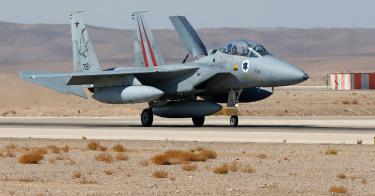Iran’s October 1 ballistic missile attack on Israel—its second in five months—put to rest any question that the Islamic Republic is in all-out war with the Jewish state. While the Middle East has been in a regional conflict since October 7, 2023, the Islamic Republic of Iran’s firing of nearly 200 ballistic missiles signaled a significant escalation as the regime sees itself at risk of losing its regional empire of terror proxies.
Unlike in April, when it attacked from a position of strength, the October 1 attack came from a position of relative weakness as Iran’s regional capabilities are being actively degraded by unprecedented Israeli operations. Now is the time for the United States to join Israel in taking the fight to Iran itself.
Iran has portrayed its attack as a response to the July killing of Hamas leader Ismail Haniyeh in Tehran and Israel’s airstrike on September 27 that killed Hezbollah leader Hassan Nasrallah and most of its senior command in Beirut.
However, its timing—just days before the Jewish high holiday season begins and a week before the anniversary of Hamas’ October 7th attack, both highly symbolic moments—suggests that, rather than retribution for killing its proxy leaders, Iran is responding more broadly to Israel’s recent string of operational successes against Hezbollah and its commencement of a ground offensive in southern Lebanon.
In the span of 10 days, beginning with the pager attack on September 17 that targeted thousands of Hezbollah operatives across Lebanon and culminating in Nasrallah’s elimination, Israel has turned the tables on Iran’s most prized regional proxy. Now, when Iran surveys its Ring of Fire assets and strategy, it sees Israel on the march.
In Gaza, Hamas has been effectively neutralized as a military threat and the IDF has downgraded operations there to pivot north to engage Hezbollah. In Yemen, Israel’s Air Force has shown that it can hit key military and economic sites with impunity in response to Houthi drone and missile attacks, which are yet to cause any significant damage. Israel has expanded its scope of operations in Syria and Iraq to more aggressively interdict Iranian weapons shipments to Lebanon and is attacking IRGC installations in response to IRGC-backed groups firing drones and other projectiles into northern Israel.
On every front, the Islamic regime has been unable to stop Israel as it presses its advantage against the regime’s regional proxies.
When Israel withdrew from Lebanon in 2000, Nasrallah delivered a victory speech in which he said that despite possessing nuclear weapons and the strongest air force in the region, “Israel is weaker than a spider’s web.”
As Israel has demonstrated in the past month, the truth is quite the opposite. And Iran knows this.
The question is, does the Biden-Harris administration?
Following Iran’s combined missile and drone attack in April against Israel, Biden shamefully told Prime Minister Benjamin Netanyahu to “take the win.” Responding to this pressure, Israel carried out a tactical strike against an air-defense system outside Isfahan—home to numerous nuclear facilities—that demonstrated its capacity to strike Iran, but did not alter the strategic balance.
So far, the U.S. response to Iran’s second attack has been more supportive, with Biden stating the administration will help Israel exact “severe consequences” and proposed a joint statement from the G-7.
Yet, almost immediately, Biden undermined his own administration’s—and Israel’s—position by stating that he would not support an Israeli strike on Iran’s nuclear facilities and then later suggesting that Israel should “be thinking about other alternatives than striking oil fields.”
Rather than publicly comment on strike packages and potential targets, the administration should maintain all options are on the table and emphasize that there is zero daylight with Israel. This is especially important as Israel expands its war against Hezbollah.
Israel’s war with Iran’s Lebanese proxy promises to be a much harder campaign than it just fought against Hamas. It will need all of its land, air and naval assets in that fight. Diverting some of these military resources—not to mention the intelligence, political and diplomatic capabilities—to engage Iran directly could risk Israel distracting itself from Lebanon.
Even if the IDF pushes Hezbollah north of the Litani River and sufficiently degrades its military capabilities so that Israel’s 80,000 internally displaced residents can return to their homes in the country’s north, the Iranian threat remains. And since twice attacking Israel directly with hundreds of missiles, Tehran presents an immediate danger that Jerusalem must address.
Yet, in any escalatory or protracted attack on Iran, the regime is likely to instruct Hezbollah to unleash volleys of thousands of rockets and missiles against Israel. Defending against such an attack demands all of Israel’s attention and resources.
However, Israel must—and will—engage Iran.
Therefore, to best support our ally and our national security interest, the administration must make clear to Iran that not only does the U.S. have the necessary capabilities deployed in the Middle East to inflict catastrophic damage on Iran’s regional assets, its domestic infrastructure and the regime itself, but it also has the required will to use force if necessary.
Ultimately, the Iranian regime must pay a price for starting a regional war. Israel has demonstrated that Iran, while still dangerous, is in a weakened position. The moment to deliver a crippling blow is now.
This piece originally appeared in National Security Journal



